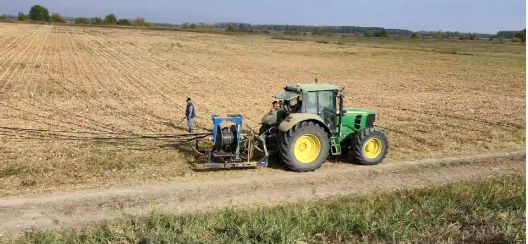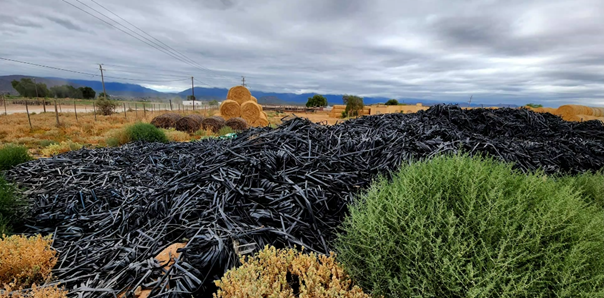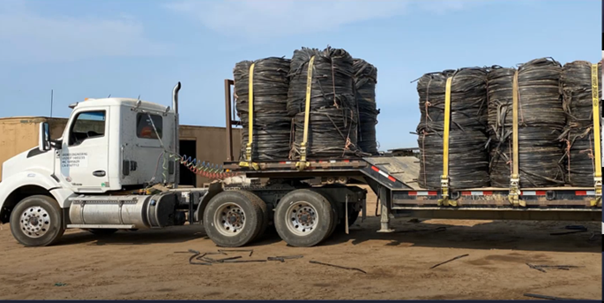This article is part of Orbia’s Megatrendsetters series, which explores how Orbia’s solutions address the transformative forces—“megatrends”—that are reshaping our world, from decarbonization and the circular economy to shifting supply chains and agribusiness to global water and digitalization. To learn more about ReGen or join the program, visit Orbia Netafim’s website here.
 Orbia Netafim collects driplines from a field to recycle them through the ReGen program.
Orbia Netafim collects driplines from a field to recycle them through the ReGen program.
Orbia’s Precision Agriculture business Netafim invented drip irrigation in 1965 after a hydraulic engineer noticed that a tree near a leaky pipe was thriving in the desert. This observation sparked the idea that plants could be watered more efficiently by slowly delivering water to the roots through a drip system. Through the following six decades, Orbia Netafim led the development of precision irrigation technology, enabling farmers and communities in 110 countries to grow more with less: achieving higher yields while using fewer resources.
Drip irrigation is the most efficient way to irrigate crops, and depending on the crop, can reduce water usage by up to 70%, energy usage by 50% and increase yields anywhere from 10-200%.
Today, Orbia Netafim is the largest drip irrigation company in the world. Each year it creates several billion meters of dripline – enough to circle the earth 210 times. This scale gives Orbia Netafim the opportunity to go beyond irrigation innovation—ensuring that every meter of dripline continues to deliver value rather than becoming waste.
Creating the ReGen Program
Farmers deploy driplines season after season, but without proper collection systems, many lines are burned, landfilled or left to degrade in fields. These practices can create environmental harm and waste a valuable asset.
 Discarded dripline in a field in South Africa waiting to be taken to a landfill.
Discarded dripline in a field in South Africa waiting to be taken to a landfill.
The ReGen program, which is the only fully circular program in the industry, is built on three cornerstones:
- ReGen Driplines: thin wall thickness driplines manufactured with recycled content. By 2030, Orbia Netafim has committed to ensuring that 45% of all plastics used in production come from recycled sources.
- Take-Back Programs: field-level solutions that help farmers efficiently retrieve and bundle used driplines, reducing cleanup time, preventing plastic pollution and cutting labor costs. In 2024, over 10,000 tons were collected for recycling and reuse.
- Advanced Recycling Facilities: Orbia Netafim has invested more than $3 million in recycling facilities, logistics, and training to strengthen the ReGen ecosystem. These investments ensure that recycled material meets strict quality standards, performing just as well – and in some cases better than—those made only with virgin plastic.
 Orbia Netafim transports collected driplines to one of three recycling facilities.
Orbia Netafim transports collected driplines to one of three recycling facilities.
The Value in Recycled Plastic
While sustainability is the driver, ReGen also delivers tangible business value. For Orbia, the program strengthens customer loyalty and opens new markets. Customers who adopt ReGen driplines rarely return to virgin-only products due to the broader benefits tied to circularity and sustainability. Export-oriented growers in particular are under increasing pressure from buyers and regulators to demonstrate alignment with the UN Sustainable Development Goals (SDGs) and sustainable agricultural practices. By irrigating with products that carry recycled content and a lower carbon footprint, these growers gain a competitive edge in international markets where sustainability credentials are no longer optional but required.
Farmers also benefit from operational advantages. Recycling driplines makes end-of-season cleanup faster and more efficient, lowers machine maintenance costs and opens opportunities for carbon and plastic credits.
“In places like Turkey, Morocco and South Africa, once farmers see how easy and clean the collection process is, there’s a real ‘wow effect,’” said Ido Raanan, Global Product Manager for Circularity at Orbia Precision Agriculture (Netafim). “Then the key to putting recycled material back into our driplines was our ability to be precise, meet global standards and ensure that the quality is either the same as virgin or even strengthened.”
The program has already reached full closed-loop operations in Mexico and the U.S., with pilots or national collection programs running in Spain, Turkey, Israel, Australia, Chile, Peru, South Africa, China and Morocco.
 Left: Orbia Netafim’s recycling plant in Mexico; Right: Dripline in the process of being recycled.
Left: Orbia Netafim’s recycling plant in Mexico; Right: Dripline in the process of being recycled.
A Zero-Waste Future
Ultimately, the ReGen Circularity Program is about advancing a win-win: protecting the environment while helping farmers run more profitable operations. By the end of 2025, Orbia Netafim plans to expand the product portfolio that includes ReGen recycled material beyond the Streamline X ReGen driplines. And with a target of 45% recycled content by 2030 and thousands of tons of plastic already diverted from landfills each year, Orbia Netafim is proving that agriculture can be both productive and circular.
“ReGen is about doing well by doing good,” Raanan added. “It’s about ensuring that no dripline is treated as waste—and that every farmer has a path to zero waste agriculture.”
From Mexico to Morocco and beyond, Orbia Netafim is closing the loop on agricultural plastics—showing that sustainability and innovation are not opposing forces, but powerful partners in growing more with less.